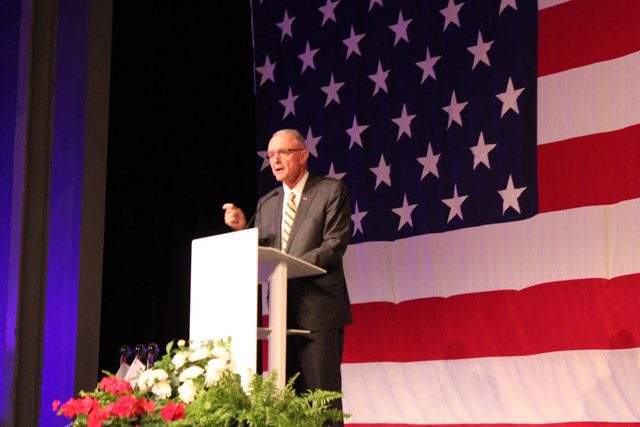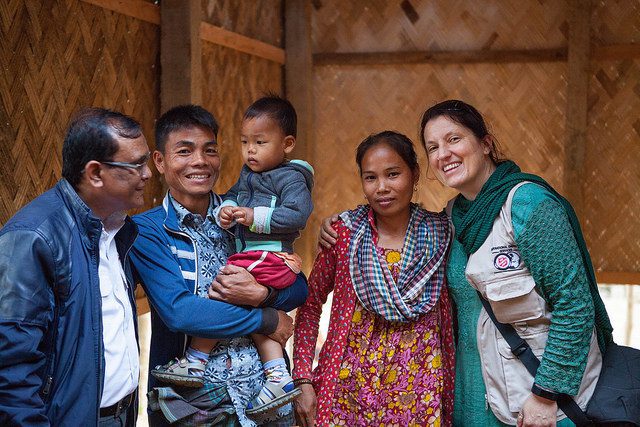By Bob Docter –
The Lord certainly asked much of her. She always delivered with courage, commitment, skill, knowledge and excellent tact.
She had a personal magnetism that drew people to her. There was an indescribable warmth in her relationships with those she served and those with whom she worked. She brought a caring kindness with her and showered it everywhere. No one was too small, too different, too difficult. Each felt important and respected.
Born on September 15, 1929, in Newcastle, Australia, she grew up as the eighth of nine children with Army officer parents. “She grew up poor,” Sam Roberts wrote in the New York Times. “We shared the life of poverty of the people around us,” she stated during a television interview.
She moved through her younger years and found her individuality in adolescence. She seemed destined for officership having been christened Evangeline Evelyn Burrows by her parents. They named her after Evangeline Booth, “daughter of the founder and the first woman chosen to be its international leader,” Roberts wrote.
Just prior to completing a bachelor’s degree at Queensland University, while attending an evangelical meeting for youth, she felt called to the alter. “She knelt, asked God to forgive her rebelliousness and vowed to submit to his will,” she said in the television interview. “I brought myself, and from that time on there was no question in my mind that my life was to be devoted to God and within the orbit of The Salvation Army.”
She never adopted a cautious status quo attitude toward her work. Her mind focused on the people of her appointment. Her mission sought God’s will for the Army, and she did nothing without discussing it thoroughly with him and those involved. Her personality would not allow her to surrender her drive toward improvement of programs and the lives of the people she served.
She was thoroughly devoted to the Army’s mission, and sought always to improve the process. She carefully examined the Army’s strategies in each appointment and then recommended ways they might be improved.
“On May 2, l986, the High Council elected Eva Burrows as the 13th General of The Salvation Army, at age 56, the youngest person elected and only the second woman General, her namesake being the other. She succeeded General Jarl Wahlstrom to office on July 9, 1986.
According to the New York Times, during her seven years she served as General, “she revamped the organization’s global structure, imposed strict financial controls and conferred regularly with heads of state. She also engineered The Army’s return to Russia, Czechoslovakia, East Germany and Hungary where it had been banned under Communist rule.”
New Frontier Publications interviewed General-elect Burrows the moment she walked out of the Sunbury Court High Council meeting room following her election as the Army’s 13th General. It seemed appropriate, then, that seven years later, we were granted an interview on the eve of her retirement.
“I get thrilled when I think of the USA Western Territory,” Burrows said. “You have such visionary programs, and I feel that you are a microcosm of the world today with your great ethnic and cultural diversity. You are an international Army in your own right, but I sensed during the congress that we were all one in Christ. Here was the Holy Spirit unifying us.”
Her seven years as General brought her to every corner of the globe. Every continent felt the impact of her leadership, as she reached out in love to the desperate and despairing of God’s children and inspired them to examine the claims of Christ.
Upon leaving office, she identified some unfinished areas we still need to work on. She regretted not emphasizing “environmental” issues, our ecology. We need to learn to live more simply so that others may simply live, she believed.
“The three evils of William Booth’s day are still with us—poverty. homelessness and unemployment,” she said. “These are moral problems that lead to crime, prostitution and inadequate nurturance of children. Also, we must be a stronger voice in matters of social justice.”
Looking again at some of her views reveals her grasp of issues and the roll the Army must play in the world now.
She maintained the characteristics that made her General—working to make things better, preaching Christ, not fearing to break free from the past and innovate while maintaining the foundations of Army teaching. She always had time for people and absolutely earned the title, “the people’s General.”















